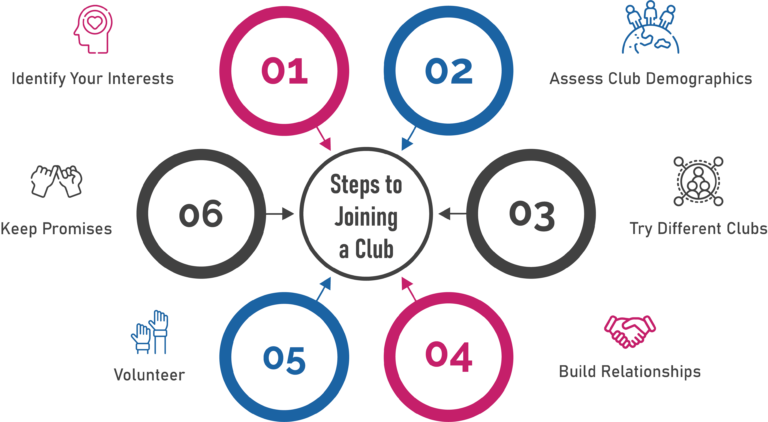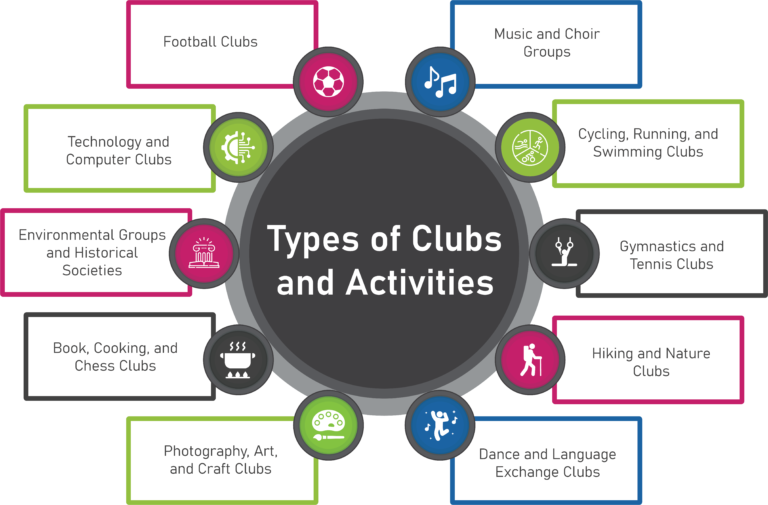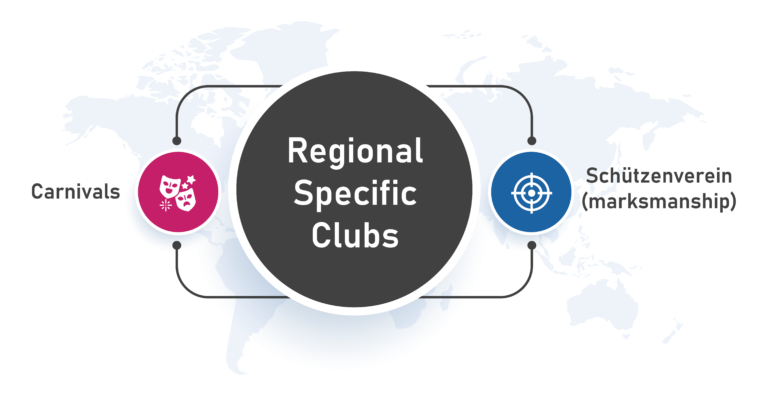Cultural integration in Germany’s club culture
When it comes to networking and socializing in Germany, it is important to understand the cultural norms and behaviors that may differ from other countries. A recent encounter with a couple who had been traveling the world and had now settled in Germany shed light on some of these differences. The couple, particularly the wife, expressed her difficulty in connecting with Germans and feeling a sense of belonging within the social system. This can be seen as unusual or even creepy to some Germans, as they are not accustomed to such interactions. Therefore, for individuals looking to network or socialize in Germany, it is important to be aware of this cultural difference and adapt one’s approach accordingly. To successfully network in Germany, it is advisable to focus on more structured environments, such as professional events or interest-based groups.
Joining clubs or organizations centered around one’s hobbies or professional interests can provide opportunities to connect with like-minded individuals who are more open to networking. Events, conferences, and workshops related to one’s field of work or interests can also serve as great platforms for networking in Germany. In summary, networking and socializing in Germany requires an understanding of the reserved nature of Germans and their inclination towards more formal and structured interactions. Initiating conversations with strangers in public places can be perceived as odd or intrusive. To effectively network and become part of the social system in Germany, it is beneficial to engage in more controlled environments such as professional events or interest-based groups. By being mindful of these cultural nuances, individuals can navigate the German social landscape and foster meaningful connections.
How do you choose a club when you want to network in Germany?
Choosing a club for networking in Germany is a process that involves considering your interests, the type of people in the club, your comfort level, and the potential for building genuine relationships. By exploring different clubs and being open to new experiences, you can find a community that resonates with you and facilitates meaningful connections. Remember, networking is not just about expanding your professional circle but also about finding friends with whom you share common interests and aspirations.
Steps to choosing and joining a club

Steps to Choosing and Joining a Club
- Identify Your Interests: Choose a club based on your hobbies or interests. This could range from sports to arts.
- Assess Club Demographics: Consider the type of people in the club. Are they of similar age or interests as you?
- Try Different Clubs: Don’t hesitate to try out different clubs to find the right fit.
- Build Relationships: Focus on moving from mere networking to forming deeper relationships.
- Volunteer: Taking up responsibilities within the club is a great way to build trust and reputation.
- Keep Promises: Be mindful of your commitments within the club. Fulfilling promises is key to gaining trust.
For example, if you had a particular interest in learning table tennis, but the club you visited was exclusively for men and made you feel uncomfortable, it would be prudent to search for a club where you feel at ease and can connect with people who align with your interests. Networking goes beyond just the shared activity; it is also about building relationships with individuals whom you genuinely want to be friends with. If the first club you try does not meet your expectations, it is essential not to be discouraged. Instead, consider exploring other options that might resonate more with you.
Keep an open mind and be willing to try out multiple clubs until you find the right fit. Remember, the primary goal is to connect with individuals who share your interests and values. Lastly, it is crucial to approach networking with a genuine intention of building relationships rather than solely focusing on the professional benefits it may bring. Moving from networking to forming meaningful connections is key. Networking is not just about exchanging business cards and making superficial acquaintances; it is about fostering relationships that can potentially enrich both personal and professional aspects of your life.
Understanding the German Social Culture
- General Reservedness: One key aspect that stood out in our conversation was the reserved nature of Germans. Unlike in many other cultures, Germans tend to be quite reserved and may not actively engage in social interactions with strangers, even in public places such as the supermarket or on public transportation. The lady mentioned how she would greet people on the train in the morning with a friendly “good morning,” only to be met with puzzled looks as if she was behaving oddly. This reserved nature can create a perception of coldness and distance for those coming from countries where interactions with strangers are more common. It is crucial to note that, while not forbidden, initiating conversations with strangers in public places is not the norm in Germany.
- Cultural Coconut Metaphor: In Germany, where I currently reside, the social dynamics can be likened to a coconut. People here don’t typically engage in small talk with strangers on the street. Instead, they are organized into small communities or clubs based on shared interests. To truly be seen and accepted in these communities, one must demonstrate their willingness to volunteer and take on responsibilities. It is through actions and keeping one’s word that trust and reliability are established. By consistently showing up, volunteering, and fulfilling the promises I make, I can build a reputation as someone who can be relied upon in times of need. This in turn helps me become more integrated into the fabric of society, shedding the label of a stranger or foreigner. Just like protecting the warmth and value of a coconut, being dependable and trustworthy allows me to become an integral part of the community.

Types of Clubs and Activities
Selecting a club that aligns with your interests can be overwhelming. Whether your passion lies in sports, music, or anything else, there’s likely a club for it in Germany.
Diverse Options:
Here’s a list of common types of clubs you might consider:
- Football Clubs: Soccer’s popularity in Germany is unmatched.
- Music and Choir Groups: Ideal for those who love to sing or play instruments.
- Cycling, Running, and Swimming Clubs: For various fitness enthusiasts.
- Gymnastics and Tennis Clubs: Popular across age groups.
- Hiking and Nature Clubs: Explore Germany’s stunning landscapes.
- Dance and Language Exchange Clubs: From ballroom to German practice.
- Photography, Art, and Craft Clubs: For creative minds.
- Book, Cooking, and Chess Clubs: Catering to diverse interests.
- Environmental Groups and Historical Societies: For those passionate about sustainability and culture.
- Technology and Computer Clubs: A hub for tech enthusiasts.
This is just maybe 1% of the ideas on what you can do in clubs, and especially in bigger cities, you will find all the variety and the selection.
Regional Specific Clubs:
There are two types of clubs in Germany that might be interesting for you as Germans, namely the so-called Schützenverein and the carnivals.
- Carnivals: Well, the carnival’s fine, which is like a carnival club. They are more regional. For example, in the region of Mainz. Gosh, now I’m not from Mainz. They are called differently. You have to mind the regional wording. Okay. Have yourself educated in the region. So in the regions of Mainz, Wiesbaden, and Cologne, they’re really big. It’s almost like you’re not human if you’re not in one of the clubs.
- Schützenverein: Schützenverein is basically marksmanship. So yeah, it’s about hunting. And that is specifically prevalent in rural areas. Again, you know, being part of a Schützenverein in small, especially small villages, that is going to give you the heart and core of being very like hard and core of German society.
Alright. So these are the Schützenverein you would find in almost every little place in the country. Again, the very simple way how you can find the most popular club is just to ask your colleagues where they are members, especially the colleagues that you like. Ask them whether they’re joining any clubs and they could introduce you because it’s always easier.


The Role of Clubs in Social Networking
Club Culture in Germany: Germany has a very strong club culture. The first thing to know about Germans and the club, which is called “Verein,” is that they are typically organized by volunteers and usually, you may pay €30 a year or some low fee. It is because everything is done on a volunteer basis.
Joining a Club: You need to find a club where you feel comfortable becoming part of German society, and inside those clubs, you can talk about anything and help each other with moving to a new house, raising your children, it doesn’t matter whether it’s related to the purpose of the club or not. People help each other. So, why do clubs fulfill such a functionality when it comes to networking in Germany? First of all, clubs build small communities like the villages back in the day, where everybody knows everybody.
Provides a secure environment to connect
If there’s a crook, you would know because people talk, people talk. If somebody was misbehaving, they would tell everybody, that thing that back in the days villages were doing. Where everybody knew about everybody. Clubs have that functionality, you know all the other members by name, you know their families, and you know what they’re doing. And this is a way to protect from fraud, for example. Because you do business much more, or any type of interaction with your children, anything regarding your house, watering your plants when you’re on vacation. Like anything, you’re more likely to trust people when you know they’re part of a community. They’ve been around maybe for years, several years. So everybody knows they have a track record of being loyal, and honest for a long period. This is how you protect against fraud, bad action, being cheated on so forth. It is through those small communities. And again, you will help each other in many other ways. It’s just to protect from being treated badly in any way. And that means if you do want to join German society as a member, that means you need to or it’s strongly encouraged to find yourself one or two clubs that you join as a member.
Make it a point to build relationships and invest. Remember, this is a vetting process. So, the best thing you can do is volunteer. Whatever club you’re joining, take responsibility, and help to organize events, and people must watch whether you keep your promises. Be cautious about what you promise. And if you promise something, make sure you follow through. Just remember, this is where you build your reputation. And you can easily build a bad reputation. So, one of the main things in these clubs is who can I trust. Who can I trust? Who is, you know, saying the truth? So if they say they will do something, they will do it; that is the people that are trusted. So make sure that if you give your word, you keep it. Because here people remember, remember that’s like a village, People talk, people remember. And that’s where you get trust, but also kept out and at a distance. If people find you’re not trustworthy, really, really make it a point to act in your best self because people remember good and bad. This is where the trust comes from. nobody can hide and forget bad behavior And now, just to give you a bit of an idea of what type of activities. I’m just saying there’s almost nothing in Germany you wouldn’t find a club on. Football clubs are very popular because football (soccer) is just a favorite.
Public Holidays and Vacations
There, are three things on public holidays and vacations, there are public holidays, which are family-related. That means as a foreigner, that would be the time when it will be hard for you to reach anybody because everybody is spending time with their families, like in India, maybe Diwali, for example.
Family Time:
Yes, that’s where, like Easter, Christmas, Sundays, and also the time school vacations for kids come in. Those are times when, if you are single, you know, everybody goes to their parents. It’s a bit harder then, so you will need to find maybe other expats who don’t have their parents around.
Community Events:
And there are types of public holidays which have public events. For example, the New Year. New Year is not a family time. It’s public, with lots of public parties, festivals, occasions where entire families and many people are gathering, or the 1st of May, for example. So, there are two different types of public holidays, if I may. Yes, which are public-public, meaning there are lots of public events, and then private-public, where everybody’s just going home to see their parents, more or less.

Networking Tips
Sharing Your Culture:
Yeah, a small aside, speaking of networking, building relationships. In Germany, a small thing that may make you smile is birthdays. In the workplace, it’s common that you bring a cake if it’s your birthday. So then you invite everybody for a treat, for a cake, and then share, and everybody will celebrate your birthday with you. Speaking of the workplace private birthday celebrations are a different thing where everybody will bring you gifts. And a small thing that is related to the cake tradition.
Navigating ‘Coconut’ Culture:
Obviously, in clubs, remember the coconut analogy. If somebody introduces you and says, “Hey, this is a nice person,” others may take less time to evaluate whether you’re a trustworthy person. Remember, this is the social fabric of knowing who to trust. Before there was Google and even today, trust is a very human thing. Okay, so find yourself a club. Just take something that excites you and where you like the people. And this is the easiest way for many people coming from abroad. They might not know this because that’s not as strong in other countries. But here that is pretty much the easiest way to become part of your little cocoon, your little family, your little tribe, where you just belong and people like you. You can exchange everything.
German Food Culture:
I like to say a funny thing about Germans—they don’t eat German food. This is, of course, only partly true. There is traditional German food. However, what’s interesting about Germans is they are very curious about trying different foods from different countries and nationalities. I think we used to be number one in traveling the world; Germans were the number one travelers. They’re quite open-minded compared to many other nations in trying food from different countries. So that means, especially in big cities, you will have very little German cuisine. You will have every international restaurant. And Germans don’t eat that much German food. You have, of course, local foods. And the more rural you get, the more pride you will have around local food. So that can be a funny thing. Sometimes, for example, especially in winery festivals. In Frankfurt, we have the Green Sauce festival, because the green sauce is a local dish. So yes, there are dishes that are celebrated, but on a day-to-day basis, Germans are very curious to try food from different nations.
What is it for you? Use any occasion you can have, bring food from your home, and give people a treat. This can be a really beautiful way for you to connect and build a relationship around where you’re coming from. Tell your story and give people an insight into your culture. Your values shine through when you bring your food. You will most of the time find lots of curiosity and openness to try different foods. Okay, so that’s just a small idea.




